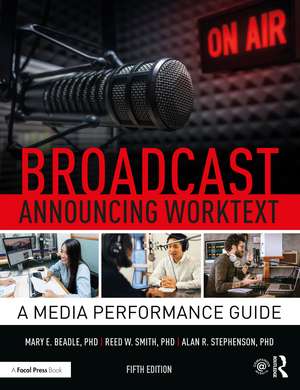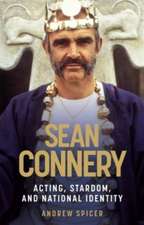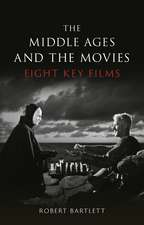Broadcast Announcing Worktext: A Media Performance Guide
Autor Alan R. Stephenson, Reed Smith, Mary E. Beadleen Limba Engleză Paperback – 14 mai 2020
Written accessibly, with easy-to-digest modules and practice projects, this book encourages active participation from readers to help develop their talent on air. In addition to the principles of good performance, the book addresses the importance of the audience and how to communicate effectively to diverse groups. The book combines traditional teaching with practical experience, and includes sample scripts and self-study exercises to allow for a practical, hands-on application of key concepts. The fifth edition, expanded throughout, features updates about performance on the Internet and social media, as well as content about podcasting and audio performance. A new chapter on international media offers readers a look at media performance and career possibilities around the world.
This book is an invaluable resource for any student of journalism, communication, or public relations looking to enhance their media performance skills.
A detailed accompanying website features audio-clips, sample test questions, and a Professionals’ Comment Bank setting out experience and advice from working pros.
| Toate formatele și edițiile | Preț | Express |
|---|---|---|
| Paperback (1) | 511.89 lei 3-5 săpt. | +33.68 lei 7-11 zile |
| Taylor & Francis – 14 mai 2020 | 511.89 lei 3-5 săpt. | +33.68 lei 7-11 zile |
| Hardback (1) | 1020.47 lei 6-8 săpt. | |
| Taylor & Francis – 12 mai 2020 | 1020.47 lei 6-8 săpt. |
Preț: 511.89 lei
Preț vechi: 556.40 lei
-8% Nou
Puncte Express: 768
Preț estimativ în valută:
97.95€ • 102.74$ • 81.54£
97.95€ • 102.74$ • 81.54£
Carte disponibilă
Livrare economică 11-25 martie
Livrare express 25 februarie-01 martie pentru 43.67 lei
Preluare comenzi: 021 569.72.76
Specificații
ISBN-13: 9780367404697
ISBN-10: 0367404699
Pagini: 328
Ilustrații: 7 Line drawings, black and white; 63 Halftones, black and white; 70 Illustrations, black and white
Dimensiuni: 210 x 280 x 24 mm
Greutate: 0.82 kg
Ediția:5 ed
Editura: Taylor & Francis
Colecția Routledge
Locul publicării:Oxford, United Kingdom
ISBN-10: 0367404699
Pagini: 328
Ilustrații: 7 Line drawings, black and white; 63 Halftones, black and white; 70 Illustrations, black and white
Dimensiuni: 210 x 280 x 24 mm
Greutate: 0.82 kg
Ediția:5 ed
Editura: Taylor & Francis
Colecția Routledge
Locul publicării:Oxford, United Kingdom
Public țintă
UndergraduateCuprins
CONTENTS
Preface
xxiii
Acknowledgments
xxv
CHAPTER 1 INTRODUCTION TO PROFESSIONAL ANNOUNCING
1.1
Introduction
1.2
Announcer, Talent, or Personality?
1.3
Announcing: An Historical Perspective
1.4
Announcing: An Employment Perspective
1.5
Announcer Specialization
1.6
Is a College Degree Necessary for a Broadcast Announcer?
1.7
Key Physical Requirements for Announcers
1.8
Key Emotional Requirements for Announcers
1.9
Is Practical Experience Necessary for a Broadcast Announcer?
1.10
Announcer Responsibilities
1.11
Role Model Announcers
1.12
Conclusions
Self-Study
Questions
Answers
Projects
Project 1 Interview a Local Announcer
Project 2 Profile a Renowned Announcer
Project 3 Complete a Self-Evaluation
CHAPTER 2 THE AUDIO PERFORMANCE ENVIRONMENT
2.1 Introduction
2.2 The Audio Studio
2.3 Microphones
2.4 Working With a Microphone
2.5 Mic Fright and Why Broadcast Performers Get It
2.6 The Broadcast Console or Audio Mixer
2.7 Music Playback Sources
2.8 Digital Audio Equipment
2.9 Podcasting (On-demand Audio)
2.10 Conclusions
Self-Study
Questions
Answers
Projects
Project 1
Record a 60 second commercial
Project 2
Practice Microphone Technique
Project 3
Investigate "Mic fright"
CHAPTER 3 THE TELEVISION PERFORMANCE ENVIRONMENT
3.1 Introduction
3.2 The Television Studio
3.3 The Television Production Crew
3.4 Television Terminology
3.5 Camera Panic
3.6 Working With a Camera
3.7 Communicating in the Studio: The IFB, Hand Signals, Cue Cards, and Prompters
3.8 Makeup
3.9 Conclusion
Self-Study
Questions
Answers
Projects
Project 1
Practice Camera Performance
Project 2
Practice Taking Hand Signals in the Television Studio
Project 3
Record a Movie Review Utilizing a Teleprompter Script
CHAPTER 4 VOCAL DEVELOPMENT
4.1
Introduction
4.2
How Sound Is Produced
4.3
Diaphragmatic Breathing Technique
4.4
Proper Breathing Posture
4.5
Key Elements of Vocal Development
4.6
Volume
4.7
Pitch
4.8
Rate
4.9
Tone
4.10
Articulation of Sounds
4.11
Pronunciation
4.12
Substandard Pronunciation
4.13
Common Vocal Problems
4.14
Maintaining a Healthy Voice
4.15
Conclusions
Self-Study
Questions
Answers
Projects
Project 1
Practice Articulation
Project 2
Practice Proper Pronunciation and Avoidance of Substandard Enunciation
Project 3
Practice Pronunciation
CHAPTER 5 PERFORMANCE DEVELOPMENT
83
5.1 Introduction
5.2 Developing a Media Delivery Style
5.3 Performance Elements
5.4 Copy Marking
5.5 Word Usage
5.6 Language Changes
5.7 Avoiding Amateurish Announcing and Inept delivery
5.8 Audience Rapport
5.9 Internet Performance
5.10 Conclusions
Self-Study
Questions
Answers
Projects
Project 1
Copy Mark and Record a Script
Project 2
Compile Jargon, Cliché, and Redundant Word Lists
Project 3
Practice Pronunciation
Project 4
Practice Inflection (Pitch Variation)
Practice Material
One Liners (Deliver With Lots of Energy)
More Quickies
CHAPTER 6 COMMERCIAL ANNOUNCING
6.1
Introduction
6.2
Sources of Commercials
6.3
Commercial Forms: Radio
6.4
Commercial Forms: Television and Cable
6.5
Considering the Basic Structure of the Commercial
6.6
Other Factors to Consider When Analyzing a Commercial
6.7
Importance of Timing
6.8
Energy: Hard Sell Versus Soft
6.9
Gestures and Expressions
6.10
Ad-lib Commercials
6.11
Acting
6.12
Commercial Voice-Overs
6.13
Public Service and Promotional Announcements
6.14
Conclusions
Self-Study
Questions
Answers
Projects
Project 1
Analyze and Record a Radio Commercial
Project 2
Record a Television Commercial
Project 3
Ad-lib a Radio Commercial From a Fact Sheet
Practice Material
Fact Sheets: Ad-lib Commercials
Commercial Copy
Dialogue Copy
CHAPTER 7 INTERVIEWING
7.1
Introduction
7.2
Types of Interviews
7.3
Basic Structure of the Media Interview
7.4
The Interview Setting
7.5
Research and Preparation
7.6
Preparing Interesting Guests and Topics
7.7
Developing Interviewing Skills
7.8
Dressing for an Interview
7.9
Keeping Control
7.10
Keeping a Neutral View
7.11
Talk Radio
7.12
Talk Television
7.13
Special Interview Situations: Politicians and Athletes
7.14
Other Interview Settings
7.15
Conclusions
Self-Study
Questions
Answers
Projects
Project 1
Record a Radio Interview
Project 2
Record a TV Interview
Project 3
Plan an Interview
CHAPTER 8 NEWS ANNOUNCING
8.1
Introduction
8.2
Determining News Value
8.3
Newscaster Criteria
8.4
News Sources
8.5
Writing the News for Electronic Media
8.6
News Operations
8.7
Social Media in News
8.8
The Radio News Anchor
8.9
The Radio News Reporter
8.10
The Television News Team and Newscast
8.11
The Television Field Reporter
8.12
Preparing the Field Report
8.13
Other Ad-lib Situations Within News
8.14
Conclusions
Self-Study
Questions
Answers
Projects
Project 1
Record Radio News
Project 2
Record TV News
Project 3A
Record On-location News as a Backpack Journalist
Project 3B
Record On-location News
Practice Material
Suggestions
CHAPTER 9 MUSIC ANNOUNCING
9.1
Introduction
9.2
The Duties of the Radio Announcer
9.3
Developing the Ability to Ad-lib
9.4
How to Be an Effective Music Announcer
9.5
Radio Program Formats
9.6
Adult Contemporary
9.7
Contemporary Hit Radio
9.8
Country
9.9
Smooth Jazz
9.10
Rock
9.11
News/Talk/Information
9.12
Urban Contemporary
9.13
Oldies
9.14
Alternative
9.15
Classical Music Announcing
9.16
Announcing According to Daypart
9.17
Announcing for Satellite Radio
9.18
Announcing for Podcasts
9.19 The Music Video Jockey
9.20
The Internet Disc Jockey
9.21
Conclusions
Self-Study
Questions
Answers
Projects
Project 1
Ad-lib Song Introductions
Project 2
Record a Disc Jockey Show
Project 3
Compare Traditional Radio, Internet Radio, and Satellite Radio
CHAPTER 10 SPORTS ANNOUNCING
10.1
Introduction
10.2
Sports Announcing
10.3
Sports Reporting
10.4
What a Sports Reporter Covers
10.5
The Sports Anchor
10.6
Play-by-Play, Sideline Reporting, and Play Analysis
10.7 Women In Sportscasting
10.8
Road Trips
10.9
Sports Talk Host
10.10
Conclusions
Self-Study
Questions
Answers
Projects
Project 1
Be a Radio Sports PBP Announcer
Project 2
Watch a Sports Broadcast
Project 3
Prepare for a Sports/Talk Show
CHAPTER 11 SPECIALTY ANNOUNCING
11.1
Introduction
11.2
Weather Reporting
11.3
The Chromakey System for Weather
11.4
Weather Reporting Styles
11.5
Traffic Reporting
11.6
Financial Reporting
11.7
What a Financial Reporter Covers
11.8
Features Specialist
11.9
Host Selling
11.10
Voice-Over and Narration
11.11
Developing Voice-Over Skills
11.12
Voice Characterizations
11.13
Program Hosting
11.14
Conclusions
Self-Study
Questions
Answers
Projects
Project 1
Be a Television Selling on a Shopping Channel
Project 2
Record a Voice-Over Public Service Announcement
Project 3
Record a Stock Market Report for Television
CHAPTER 12 LEGAL AND ETHICAL ISSUES FOR MEDIA PERFORMERS
12.1
Introduction
12.2
Codes of Ethical Standards
12.3
Payola and Plugola
12.4
Staged News
12.5
Hoaxes and Pranks
12.6
Payment for News Stories
12.7
Political Coverage
12.8
Sports Coverage
12.9
Sensationalism
12.10
Conflict of Interest
12.11
Privacy
12.12
Libel and Slander
12.13
Contests and Lotteries
12.14
Protection of Sources
12.15
Access to Government Information
12.16
Fairness Doctrine
12.17
Section 315
12.18
Copyright
12.19
Profanity, Indecency, and Obscenity
12.20
Ethical and Legal Issues for "Online Performers"
12.21
Conclusions
Self-Study
Questions
Answers
Projects
Project 1
To Think and Discuss an Ethical Media Issue and the Implications for Personal Responsibility
Project 2
To Discuss a Legal Media Issue and Understand the Implications of Your Actions as a Reporter
Project 3
To Discuss the Ethical Dilemmas Faced by Electronic Journalists Based on Real Incidents That Occurred in the Media
CHAPTER 13 BEGINNING AN ANNOUNCING CAREER
1 3.1
Introduction
1 3.2
Writing Your Resume
1 3.3
Electronic Resumes
1 3.4
Adding a Cover Letter
13.5
Making Your Air Check or Demo Recording
1 3.6
Networking Developing a Contact List
1 3.7
Interviewing for a Job
13.8
Responding to a Job Offer
13.9
Unions, Agents, and Contracts
13.10
Losing That First Job: A Fact of Broadcast Performance Life
13.11
Conclusions
Self-Study
Questions
Answers
Projects
Project 1
Prepare Your Professional Resume
Project 2
Write a Cover Letter
Project 3
Record an Audition for Radio
Project 4
Prepare an Electronic Resume
Project 5
Record an Audition for Television
Chapter 14 Media Performance: A Global Perspective
14.1 Introduction
14.2 Culture
14.3 Overview of global media freedom
14.4 Use of radio transmitted to global community
14.5 News
14.6 Sports
14.7 Advertising
14.8 Music
14.9 Conclusions
Self-Study
Questions
Answers
Projects
Project 1
Write a report on an international media organization to understand the function of the organization.
Project 2
Compare how a transnational news source reports a new story to a US news source report on the same story.
Project 3
View and compare an international media performance to a US media performance
GLOSSARY see website
WEATHER TERMS see website
INDEX
COMPANION WEBSITE
Please visit the companion website page to listen to instructional audio tracks:
http://www.routledge.com/cw/stephenson
4.1B Announcer Vocal Variety
4.2 160 Words Per Minute
4.3 Breathing
4.4 Whining
4.5 Husky
4.6 Breathless
4.7 Sibilance
4.8 Plosives
5.1 Announcer Reads with Little Inflection
5.2 Announcer reads with Inflection
5.3 Announcer Pauses
6.1 Straight Read
6.2 Music Bed
6.3 Dramatization
6.4 Style Variety
6.5A Hard Sell Copy
6.5B Soft Sell Copy
6.6 Audition
6.7 PSA
6.8 Promo
7.1 Listening
7.2 Talk Show
7.3 Questions
8.2 Know Your Community
8.3 Interview
9.2 Contemporary Hit Music Announcing
9.3 Country Music Announcing
9.4 Alternative Music Announcing
9.5 Classical Music Announcing
10.1 Sports Feature 1
10.2 Sports Feature 2
10.3 Pre-Game
10.4 Radio Play-By-Play
10.5 Soccer Play-By-Play
10.6 Basketball Play-By-Play1
10.7 Basketball Play-By-Play2
10.8 Sports Analysis
10.9 Sports Talk
11.1 Going Wrong
11.2 Student Ad-Lib
THE PROFESSIONALS’ COMMENT BANK
On the website, you will find a large collection of comments, experiences, and advice from many working pros who took the time to sit down and share their knowledge with you. They were honest, straightforward, and in some cases quite humorous. Many of the clips are referenced in chapters where they are particularly appropriate, but it is worth your time to view everything they have to say. Most of the clips are around a minute long. We have tried to guide you with an appropriate title or question for each clip, so you will know to what each pro is responding. If you start at the first clip and go through them in order, you will get most of the interview.
SONYA THOMPSON (NEWS DIRECTOR)
1. Breaking In: You Can Be the Exception
0:45:09
2. Hiring: It Depends on Your Voice
1:30:14
3. Hiring: The Importance of Internships
0:36.13
4. Hiring: The Importance of the Internet
0:34:08
5. Hiring: What Do You Want to Do?
0:48:20
6. Hiring: What to Do When Applying
0:29:20
7. Hiring: Applications — Be Truthful
1:04:03
8. Hiring: You Have to Be Aware
1:03:07
9. Hiring: You Need to Be Able to Shoot
1:05:19
10. Hiring: You Need to Keep Up With Developments
0:35:24
11. Hiring: Video Journalists’ Job and Responsibilities
1:55:02
LINDA THOMAS (RADIO NEWS ANCHOR)
1. Why Radio?
0:38:22
2. How Did You Start?
0:34:26
3. How Do You Learn to Ad-Lib
0:13:09
4. How Do You Build a News Story?
0:32:19
5. How Long Is a News Story?
0:51:01
6. How Do You Feel About Social Media?
1:33:23
7. How Do You Use Social Media?
0:34:01
8. Do You Have Any Television Experience?
1:09:02
9. Do You Blog?
0:37:18
10. Radio: You Can’t Do Just One Thing
1:28:26
11. Social Media’s Effect on One Story
0:50:05
12. It’s a Great Time to Be in Broadcasting
0:43:09
13. You’ve Got to Know the Story
0:34:20
14. Learn The Local Names
0:35:11
15. How Do You Get a Professional Sound?
0:39:01
16. How Do You Handle a Mistake?
1:00:12
17. How Do You Plan a Question?
0:31:10
18. How Do You Plan an Ad-Lib?
0:44:17
ANGELICA CAMPOS (WEATHERCASTER)
1. Weather: How Did You Get Started?
1:50:09
2. Weather: How Do You Plan a Report?
0:21:26
3. Weather: How Do You Handle All the Information?
0:39:24
4. Weather: How Much Do You Use Notes?
1:11:07
5. Weather: How Did You Learn Chroma-key?
1:01:03
6. Weather: Who Produces Your Graphics?
1:21:14
7. Weather: The Challenge of Multitasking
1:27:09
8. Weather: How Did You Handle the Fact You Spoke Spanish First?
1:20:05
9. Weather: What’s the Challenge of Forecasting in a Complex Weather Area?
1:22:24
10. Do You Have Some Advice for those Considering a Career in Weather?
0:49:22
ANNE SILBERMAN (PRODUCER AND TRAFFIC REPORTER)
1. Radio: What Have You Done?
0:49:01
2. What Can Happen When You Take a Radio Job?
0:54:25
3. When Doing Country Music, Did You Use a Twang?
0:33:24
4. Traffic: What Is It Like Doing Traffic Reporting?
1:35:00
5. Traffic: How Do You Keep Up With Developments?
0:55:02
6. Traffic: It’s All Improvised
0:50:16
7. Traffic: Get To Know the Area
0:45:10
8. Traffic: Dealing With Consolidation
0:29:02
9. Traffic: Matching Audience Expectations
0:51:08
10. Traffic: How Long Are Reports?
0:53:27
11. Traffic: Why Do It?
1:05:20
LARRY RICE (WEATHERCASTER)
1. Weather: Situational Awareness
0:36:16
2. Weather: How Do You Go About a Report?
0:48:14
3. Weather: Are You Ever Asked to Change Length of the Report?
0:26:26
4. Weather: How Do You Prompt Your Ad-Libs?
0:44:16
5. Weather: How Often Do Weathercasters Get the Forecast Right?
1:15:12
6. Weather: When You Started How Did You Become Conversational?
0:41:22
7. Weather: Any Tricks to Control Speaking Rate?
0:43:04
8. Weather: Can You Plan a Career in Weather Today?
1:18:13
JESSICA GOTTESMAN (HOST ON SIRIUS XM RADIO)
1. Radio: How Do You Use Twitter for News?
1:00:18
2. Television: How Do You Handle Reading From a Teleprompter?
0:39:18
3. How Do You Improve Your Delivery?
1:09:11
4. Do You Have a Tip on Teleprompter Reading?
0:38:10
JOHN SHARIFY (TV STATION GENERAL MANAGER AND FORMER TV REPORTER)
1. How Have You Spent Most of Your Career?
0:45:17
2. Voice-Over: It’s Important To Read It Out Loud
1:30:00
3. Voice-Over: How Loud Do You Speak?
1:32:13
4. Teleprompter: How Do You Do It Effectively?
1:23:13
5. Live Stand-ups: How Do You Handle It?
1:17:11
6. Picking Stories: Pitch Some of Your Own
1:09:02
7. Live Stand-ups: Practice, Practice, Practice
2:26:01
8. Live Stand-ups: In Terms of Energy
1:37:17
9. News: The Way I Think About Writing
1:07:19
10. News: Finding Stories
0:55:12
STEFANI SCHAEFER (TV MORNING ANCHOR)
1. How Do You Speak Conversationally on The Air?
0:30:16
2. How Did You Improve Your Pitch?
0:43:58
3. Do You Still Mark Your Copy?
0:38:17
4. How Important Is Writing?
1:13:24
5. Tell Me About Your Workload
1:13:24
6. Please Talk About the Challenges of a Field Reporter
1:02:01
7. How Does Social Media Fit in?
0:31:24
8. Do You Use Facebook During the Show?
0:49:29
9. How Do You Become a Good Ad-Libber
0:52:18
10. What Was It Like When You First Went on the Air?
1:10:21
11. Do Your Emotions Get Into Your Stories?
1:03:10
12. How Have You Managed Your Career?
0:52:25
13. A Final Word of Advice
0:15:10
WAYNE DAWSON (TV MORNING ANCHOR)
1. How Did You Get Started?
0:55:04
2. Do You Write Most of Your Copy?
1:19:14
3. How Much Do You Read the Scripts in Advance?
0:37:02
4. How Did You Practice at First?
0:44:03
5. Any Other Thoughts on Delivery?
0:37:18
6. Do You Mark Your Scripts?
0:30:05
7. Any Thought on the Matter of an Ethnic Sound?
1:09:14
8. How Do You Use Facebook?
0:25:04
9. Whom Do You Focus on When You’re on the Air?
0:51:04
10. What’s The Hardest Part of Your Job?
1:05:16
11. How Do You Prepare for Interviews?
0:39:28
12. What’s Your Final Advice?
1:04:07
JOHN KATSILOMETES (RADIO TALK HOST AND MEDIA WRITER)
1. How Did You Get Started?
1:22:05
2. Tell Me About Being a Multimedia Journalist
1:00:04
3. What Aspects Have You Learned About Interviewing?
1:25:00
4. Tell Me About the Kind of Interviews You on Your Radio Show
1:43:09
5. How Does Being a Journalist Help Your Broadcast Interviews?
1:42:25
6. How Do You Handle Unusual Interview Situations?
1:46:19
7. How Do You Deal With Losing Your Train-of-Thought in a Radio Interview?
1:20:19
8. Working Across the Media, Does One Provide Ideas for Another?
1:08:24
9. Is Your Writing for Print and Online Similar or Different?
1:23:08
10. Your Job Makes You Sound Like You Are Both a Freelancer and Committed to a Company
1:41:00
11. Any Other Tips for Career Preparation?
0:39:29
SCOTT SABOL (WEATHERCASTER)
1. Weather: Do You Still Watch Your Tapes to Improve?
1:08:00
2. Weather: How Has the Changing Technology Affected You?
1:00:27
3. Weather: Do You Do Online Reports Too?
0:39:28
4. Weather: Have the Changes in Technology Changed Your Performance?
1:11:03
5. Weather: How Did You Learn the Chroma-key?
1:25:23
6. Weather: Please Tell Me About Manipulating All the Maps
1:27:28
7. Weather: How Do You Handle Last Second Requests to Shorten or Lengthen Your Reports?
1:01:06
8. Weather: How Do You Prepare for the Unexpected?
1:46:25
9. Weather: What Is It Like Having so Much Going on?
0:32:08
10. Weather: What Does the Producer Say to You in Your Earpiece?
1:01:16
11. Weather: Please Tell Me About the Seal of Approval
1:17:15
12. Weather: How Do You Handle All the Things Going on Around You?
1:01:02
13. Weather: How Has the Atmosphere in the Studio Changed?
0:47:16
14. Weather: How Do You Use Nonverbals in Front of the Camera?
1:32:27
15. Weather: Can You Suggest Other Ways to Improve?
0:49:08
16. Weather: Do You Have Any Other Tips for Success?
1:31:05
DAN JOVIC (SPORTS AND NEWS REPORTER)
1. How Did You Get Started? What Role Did Writing Have?
0:48:11
2. What Do You Feel Are the Most Important Abilities to Succeed Today?
1:05:10
3. Sports: What Do You Have to Do to Be Successful?
1:31:06
4. Sports: It Seems That the Job of a Sportscaster Has Changed
0:44:12
5. Sports: How Do You Compete With the National Sources?
1:28:17
6. Sports: How Do You Plan a Program?
1:18:11
7. News: How Do You Stimulate Interactivity?
1:04:02
8. News: How Do You Integrate the Internet With Your News Broadcasts?
1:36:12
9. News: Could You Tell Me About How You Use a Webcam?
1:36:06
10. News: How Do You Connect With the Audience on the Webcam?
1:08:09
11. News: How Do You Prepare for a Webcam Report?
0:51:29
12. News: How Do You Stay Focused With so Much Going on?
1:05:02
13. Do You Have Any Final Advice for Someone Interested in Broadcasting?
0:51:12
KENNY CRUMPTON (TV FEATURE REPORTER)
1. How Did You Get Interested in Broadcasting?
1:08:05
2. What Did You Do in College?
0:59:17
3. What Were Your Biggest Surprises When You Started Working?
1:36:07
4. At The Beginning, How Did You Practice Your Pacing, Inflection, and Pronunciation?
2:04:07
5. Please Tell Me More About Eye Energy
0:40:10
6. How Do You Plan the Ad-Lib for Your Feature Interviews?
2:08:08
7. What Do You Do if Someone Doesn’t Show Up for an Interview?
1:11:25
8. News: How Do You Handle It When You’ve Only Been on the Scene a Few Minutes?
1:03:07
9. News: How Do You Prepare for All The Different Things You Might Have to Cover?
1:06:20
10. News: How Do You Connect With the Audience When Doing a Story?
1:33:29
11. News: Please Talk About Coming Across With Energy
0:55:27
12. News: How Do You Go about Visualizing a Story?
1:44:15
13. News: Do You Have Any Tips on Reading Teleprompter?
0:40:00
14. News: What Are Your Tips for Success in This Business?
1:20:16
NATHAN TANNENBAUM (WEATHERCASTER AND MULTIMEDIA PRODUCER)
1. What Are You Doing in Media Today?
0:28:05
2. How Does a Video Newscast Over the Web Differ From Traditional Broadcasts?
0:45:28
3. What Skills Do You Need to Be a "One-Man-Band" in a Video Newscast?
1:16:06
4. How Does Your Work Differ From a Traditional TV Station?
0:54:00
5. Please Speak About the Writing for Your Webcast? Is It Different?
0:35:15
6. Do You Do Any Shooting With all Your Other Skills?
0:25:24
7. What Is the Role Of Print Reporters in Your Webcast?
0:38:06
8. Weather: How Do You Build a Connection With the Viewers?
0:29:08
9. Weather: How Much Time Should You Expect to Devote to Preparing a Weathercast?
0:42:02
10. Any Thoughts on Ad-Libbing?
0:40:03
11. Any Final Tips or Suggestions for Prospective Media Specialists?
0:29:25
LISA BROOKS CRAZE (RADIO NEWS ANCHOR AND TALK HOST)
1. What Kind of Media Work Have You Done?
0:30:16
2. Please Tell Me About Being a Field Reporter
0:47:07
3. Field Reporting: Did You Write Out Your Stories or Always Ad-Lib?
0:50:19
4. What’s Your Secret to a Good Ad-Lib?
0:43:03
5. How Do You Prepare for a News Ad-Lib?
0:53:27
6. How Have Computers Affected Your News Reporting?
2:15:29
7. News: How Big a Factor Is Time in Your Work?
1:44:15
8. What Is the Role of Your Board Operator in a Three Hour Music Show?
0:49:01
9. Please Talk About Mood And Energy in an Hour Newscast
0:49:09
10. Where Does Your Energy Come From?
0:35:24
11. Could You Discuss the Importance of Enunciation?
1:01:11
12. Do You Gesture While You’re on Radio?
0:30:12
13. Could You Give Me Some Tips on Managing Time?
1:00:17
14. Could You Tell Me That Story About Tigers and Its Significance for a Newscast?
1:08:03
15. How Do You Feel About Breaking Character While on the Air?
0:44:25
16. Do You Have Any Approaches for Relating To Your Audience?
0:50:12
17. Do You Have Any Special Approaches With Microphones?
0:21:12
18. What Are Your Views on Writing?
0:20:18
19. You’ve Said You Believe in Helping Others in the Business
1:14:09
20. Could You Talk About the Different Styles Related to Station Formats?
1:20:07
21. Commercials: How Do You Approach Doing a New Commercial Message?
0:59:06
22. Commercials: How Do You Judge the Number of Words and Your Reading Rate?
0:51:06
23. News: Do You Have Any Trips For Adjusting the Copy to the Time Available?
0:39:09
24. Talk and Call-Ins: How Do You Manage Guests on a Call-In Show?
2:55:28
25. Talk and Call-Ins: How Do You Handle a Rude Caller?
0:28:22
26. Talk and Call-Ins: How Do You Identify Topics for a Call-In Show?
0:52:06
27. Social Media: What Has Been the Impact Of Social Media?
1:40:05
AL PAWLOWSKI (TV SPORTSCASTER AND TALK HOST)
1. How Did You Become a Sportscaster?
1:01:17
2. You’re Going to Work, What Will You Be Doing Today?
2:21:16
3. What Do You Mean By "Using Your Voice?"
1:08:28
4. Please Talk About Your Techniques for Interviewing Athletes
2:12:04
5. How Do You Handle Your Delivery Rate?
1:18:29
6. Do You "Change Gears" When Reporting News?
1:28:29
7. Please Tell Me About Your Restaurant Show
2:39:14
8. What Is It Like Being an Independent Contractor?
2:14:26
9. Please Talk About Being on the Road In Sports
3:05:03
10. How Much Writing Do You Do?
1:55:21
11. Please Talk About the Experience of Someone Talking in Your Ear
1:26:26
12. What’s Your Best Advice For Finding a Job In Sports?
2:04:19
13. Please Talk About Your Use of Your Website (see Pawlowski’s webpage on YouTube, enter AlPawowski)
1:25:26
EDWARD SEIBOLT (FREQUENT QVC GUEST HOST)
1. How Do You Prepare For An Appearance On QVC?
0:48:01
2. Please Speak On The Process Of Presenting A Product?
0:33:27
3. Do You Have A Specific Style For Delivery When Selling?
0:49:18
4. Could You Speak some more On The Delivery Style You Use?
0:52:06
5. Any Other Performance Tips?
0:27:02
6. Could You Tell Me What It’s Like At QVC?
1:01:06
7. What’s Your Experience With Having Someone Talking In Your Ear While You’re On The Air?
0:44:19
8. Is The On-Air Environment A Bit Overwhelming At First?
0:38:06
9. Have You Ever Made Any On-Air Mistakes?
0:41:00
10. Have You Witnessed Any On-Air Mistakes?
0:30:28
Preface
xxiii
Acknowledgments
xxv
CHAPTER 1 INTRODUCTION TO PROFESSIONAL ANNOUNCING
1.1
Introduction
1.2
Announcer, Talent, or Personality?
1.3
Announcing: An Historical Perspective
1.4
Announcing: An Employment Perspective
1.5
Announcer Specialization
1.6
Is a College Degree Necessary for a Broadcast Announcer?
1.7
Key Physical Requirements for Announcers
1.8
Key Emotional Requirements for Announcers
1.9
Is Practical Experience Necessary for a Broadcast Announcer?
1.10
Announcer Responsibilities
1.11
Role Model Announcers
1.12
Conclusions
Self-Study
Questions
Answers
Projects
Project 1 Interview a Local Announcer
Project 2 Profile a Renowned Announcer
Project 3 Complete a Self-Evaluation
CHAPTER 2 THE AUDIO PERFORMANCE ENVIRONMENT
2.1 Introduction
2.2 The Audio Studio
2.3 Microphones
2.4 Working With a Microphone
2.5 Mic Fright and Why Broadcast Performers Get It
2.6 The Broadcast Console or Audio Mixer
2.7 Music Playback Sources
2.8 Digital Audio Equipment
2.9 Podcasting (On-demand Audio)
2.10 Conclusions
Self-Study
Questions
Answers
Projects
Project 1
Record a 60 second commercial
Project 2
Practice Microphone Technique
Project 3
Investigate "Mic fright"
CHAPTER 3 THE TELEVISION PERFORMANCE ENVIRONMENT
3.1 Introduction
3.2 The Television Studio
3.3 The Television Production Crew
3.4 Television Terminology
3.5 Camera Panic
3.6 Working With a Camera
3.7 Communicating in the Studio: The IFB, Hand Signals, Cue Cards, and Prompters
3.8 Makeup
3.9 Conclusion
Self-Study
Questions
Answers
Projects
Project 1
Practice Camera Performance
Project 2
Practice Taking Hand Signals in the Television Studio
Project 3
Record a Movie Review Utilizing a Teleprompter Script
CHAPTER 4 VOCAL DEVELOPMENT
4.1
Introduction
4.2
How Sound Is Produced
4.3
Diaphragmatic Breathing Technique
4.4
Proper Breathing Posture
4.5
Key Elements of Vocal Development
4.6
Volume
4.7
Pitch
4.8
Rate
4.9
Tone
4.10
Articulation of Sounds
4.11
Pronunciation
4.12
Substandard Pronunciation
4.13
Common Vocal Problems
4.14
Maintaining a Healthy Voice
4.15
Conclusions
Self-Study
Questions
Answers
Projects
Project 1
Practice Articulation
Project 2
Practice Proper Pronunciation and Avoidance of Substandard Enunciation
Project 3
Practice Pronunciation
CHAPTER 5 PERFORMANCE DEVELOPMENT
83
5.1 Introduction
5.2 Developing a Media Delivery Style
5.3 Performance Elements
5.4 Copy Marking
5.5 Word Usage
5.6 Language Changes
5.7 Avoiding Amateurish Announcing and Inept delivery
5.8 Audience Rapport
5.9 Internet Performance
5.10 Conclusions
Self-Study
Questions
Answers
Projects
Project 1
Copy Mark and Record a Script
Project 2
Compile Jargon, Cliché, and Redundant Word Lists
Project 3
Practice Pronunciation
Project 4
Practice Inflection (Pitch Variation)
Practice Material
One Liners (Deliver With Lots of Energy)
More Quickies
CHAPTER 6 COMMERCIAL ANNOUNCING
6.1
Introduction
6.2
Sources of Commercials
6.3
Commercial Forms: Radio
6.4
Commercial Forms: Television and Cable
6.5
Considering the Basic Structure of the Commercial
6.6
Other Factors to Consider When Analyzing a Commercial
6.7
Importance of Timing
6.8
Energy: Hard Sell Versus Soft
6.9
Gestures and Expressions
6.10
Ad-lib Commercials
6.11
Acting
6.12
Commercial Voice-Overs
6.13
Public Service and Promotional Announcements
6.14
Conclusions
Self-Study
Questions
Answers
Projects
Project 1
Analyze and Record a Radio Commercial
Project 2
Record a Television Commercial
Project 3
Ad-lib a Radio Commercial From a Fact Sheet
Practice Material
Fact Sheets: Ad-lib Commercials
Commercial Copy
Dialogue Copy
CHAPTER 7 INTERVIEWING
7.1
Introduction
7.2
Types of Interviews
7.3
Basic Structure of the Media Interview
7.4
The Interview Setting
7.5
Research and Preparation
7.6
Preparing Interesting Guests and Topics
7.7
Developing Interviewing Skills
7.8
Dressing for an Interview
7.9
Keeping Control
7.10
Keeping a Neutral View
7.11
Talk Radio
7.12
Talk Television
7.13
Special Interview Situations: Politicians and Athletes
7.14
Other Interview Settings
7.15
Conclusions
Self-Study
Questions
Answers
Projects
Project 1
Record a Radio Interview
Project 2
Record a TV Interview
Project 3
Plan an Interview
CHAPTER 8 NEWS ANNOUNCING
8.1
Introduction
8.2
Determining News Value
8.3
Newscaster Criteria
8.4
News Sources
8.5
Writing the News for Electronic Media
8.6
News Operations
8.7
Social Media in News
8.8
The Radio News Anchor
8.9
The Radio News Reporter
8.10
The Television News Team and Newscast
8.11
The Television Field Reporter
8.12
Preparing the Field Report
8.13
Other Ad-lib Situations Within News
8.14
Conclusions
Self-Study
Questions
Answers
Projects
Project 1
Record Radio News
Project 2
Record TV News
Project 3A
Record On-location News as a Backpack Journalist
Project 3B
Record On-location News
Practice Material
Suggestions
CHAPTER 9 MUSIC ANNOUNCING
9.1
Introduction
9.2
The Duties of the Radio Announcer
9.3
Developing the Ability to Ad-lib
9.4
How to Be an Effective Music Announcer
9.5
Radio Program Formats
9.6
Adult Contemporary
9.7
Contemporary Hit Radio
9.8
Country
9.9
Smooth Jazz
9.10
Rock
9.11
News/Talk/Information
9.12
Urban Contemporary
9.13
Oldies
9.14
Alternative
9.15
Classical Music Announcing
9.16
Announcing According to Daypart
9.17
Announcing for Satellite Radio
9.18
Announcing for Podcasts
9.19 The Music Video Jockey
9.20
The Internet Disc Jockey
9.21
Conclusions
Self-Study
Questions
Answers
Projects
Project 1
Ad-lib Song Introductions
Project 2
Record a Disc Jockey Show
Project 3
Compare Traditional Radio, Internet Radio, and Satellite Radio
CHAPTER 10 SPORTS ANNOUNCING
10.1
Introduction
10.2
Sports Announcing
10.3
Sports Reporting
10.4
What a Sports Reporter Covers
10.5
The Sports Anchor
10.6
Play-by-Play, Sideline Reporting, and Play Analysis
10.7 Women In Sportscasting
10.8
Road Trips
10.9
Sports Talk Host
10.10
Conclusions
Self-Study
Questions
Answers
Projects
Project 1
Be a Radio Sports PBP Announcer
Project 2
Watch a Sports Broadcast
Project 3
Prepare for a Sports/Talk Show
CHAPTER 11 SPECIALTY ANNOUNCING
11.1
Introduction
11.2
Weather Reporting
11.3
The Chromakey System for Weather
11.4
Weather Reporting Styles
11.5
Traffic Reporting
11.6
Financial Reporting
11.7
What a Financial Reporter Covers
11.8
Features Specialist
11.9
Host Selling
11.10
Voice-Over and Narration
11.11
Developing Voice-Over Skills
11.12
Voice Characterizations
11.13
Program Hosting
11.14
Conclusions
Self-Study
Questions
Answers
Projects
Project 1
Be a Television Selling on a Shopping Channel
Project 2
Record a Voice-Over Public Service Announcement
Project 3
Record a Stock Market Report for Television
CHAPTER 12 LEGAL AND ETHICAL ISSUES FOR MEDIA PERFORMERS
12.1
Introduction
12.2
Codes of Ethical Standards
12.3
Payola and Plugola
12.4
Staged News
12.5
Hoaxes and Pranks
12.6
Payment for News Stories
12.7
Political Coverage
12.8
Sports Coverage
12.9
Sensationalism
12.10
Conflict of Interest
12.11
Privacy
12.12
Libel and Slander
12.13
Contests and Lotteries
12.14
Protection of Sources
12.15
Access to Government Information
12.16
Fairness Doctrine
12.17
Section 315
12.18
Copyright
12.19
Profanity, Indecency, and Obscenity
12.20
Ethical and Legal Issues for "Online Performers"
12.21
Conclusions
Self-Study
Questions
Answers
Projects
Project 1
To Think and Discuss an Ethical Media Issue and the Implications for Personal Responsibility
Project 2
To Discuss a Legal Media Issue and Understand the Implications of Your Actions as a Reporter
Project 3
To Discuss the Ethical Dilemmas Faced by Electronic Journalists Based on Real Incidents That Occurred in the Media
CHAPTER 13 BEGINNING AN ANNOUNCING CAREER
1 3.1
Introduction
1 3.2
Writing Your Resume
1 3.3
Electronic Resumes
1 3.4
Adding a Cover Letter
13.5
Making Your Air Check or Demo Recording
1 3.6
Networking Developing a Contact List
1 3.7
Interviewing for a Job
13.8
Responding to a Job Offer
13.9
Unions, Agents, and Contracts
13.10
Losing That First Job: A Fact of Broadcast Performance Life
13.11
Conclusions
Self-Study
Questions
Answers
Projects
Project 1
Prepare Your Professional Resume
Project 2
Write a Cover Letter
Project 3
Record an Audition for Radio
Project 4
Prepare an Electronic Resume
Project 5
Record an Audition for Television
Chapter 14 Media Performance: A Global Perspective
14.1 Introduction
14.2 Culture
14.3 Overview of global media freedom
14.4 Use of radio transmitted to global community
14.5 News
14.6 Sports
14.7 Advertising
14.8 Music
14.9 Conclusions
Self-Study
Questions
Answers
Projects
Project 1
Write a report on an international media organization to understand the function of the organization.
Project 2
Compare how a transnational news source reports a new story to a US news source report on the same story.
Project 3
View and compare an international media performance to a US media performance
GLOSSARY see website
WEATHER TERMS see website
INDEX
COMPANION WEBSITE
Please visit the companion website page to listen to instructional audio tracks:
http://www.routledge.com/cw/stephenson
- Practical Experience
- Paul Harvey
4.1B Announcer Vocal Variety
4.2 160 Words Per Minute
4.3 Breathing
4.4 Whining
4.5 Husky
4.6 Breathless
4.7 Sibilance
4.8 Plosives
5.1 Announcer Reads with Little Inflection
5.2 Announcer reads with Inflection
5.3 Announcer Pauses
6.1 Straight Read
6.2 Music Bed
6.3 Dramatization
6.4 Style Variety
6.5A Hard Sell Copy
6.5B Soft Sell Copy
6.6 Audition
6.7 PSA
6.8 Promo
7.1 Listening
7.2 Talk Show
7.3 Questions
8.2 Know Your Community
8.3 Interview
9.2 Contemporary Hit Music Announcing
9.3 Country Music Announcing
9.4 Alternative Music Announcing
9.5 Classical Music Announcing
10.1 Sports Feature 1
10.2 Sports Feature 2
10.3 Pre-Game
10.4 Radio Play-By-Play
10.5 Soccer Play-By-Play
10.6 Basketball Play-By-Play1
10.7 Basketball Play-By-Play2
10.8 Sports Analysis
10.9 Sports Talk
11.1 Going Wrong
11.2 Student Ad-Lib
THE PROFESSIONALS’ COMMENT BANK
On the website, you will find a large collection of comments, experiences, and advice from many working pros who took the time to sit down and share their knowledge with you. They were honest, straightforward, and in some cases quite humorous. Many of the clips are referenced in chapters where they are particularly appropriate, but it is worth your time to view everything they have to say. Most of the clips are around a minute long. We have tried to guide you with an appropriate title or question for each clip, so you will know to what each pro is responding. If you start at the first clip and go through them in order, you will get most of the interview.
SONYA THOMPSON (NEWS DIRECTOR)
1. Breaking In: You Can Be the Exception
0:45:09
2. Hiring: It Depends on Your Voice
1:30:14
3. Hiring: The Importance of Internships
0:36.13
4. Hiring: The Importance of the Internet
0:34:08
5. Hiring: What Do You Want to Do?
0:48:20
6. Hiring: What to Do When Applying
0:29:20
7. Hiring: Applications — Be Truthful
1:04:03
8. Hiring: You Have to Be Aware
1:03:07
9. Hiring: You Need to Be Able to Shoot
1:05:19
10. Hiring: You Need to Keep Up With Developments
0:35:24
11. Hiring: Video Journalists’ Job and Responsibilities
1:55:02
LINDA THOMAS (RADIO NEWS ANCHOR)
1. Why Radio?
0:38:22
2. How Did You Start?
0:34:26
3. How Do You Learn to Ad-Lib
0:13:09
4. How Do You Build a News Story?
0:32:19
5. How Long Is a News Story?
0:51:01
6. How Do You Feel About Social Media?
1:33:23
7. How Do You Use Social Media?
0:34:01
8. Do You Have Any Television Experience?
1:09:02
9. Do You Blog?
0:37:18
10. Radio: You Can’t Do Just One Thing
1:28:26
11. Social Media’s Effect on One Story
0:50:05
12. It’s a Great Time to Be in Broadcasting
0:43:09
13. You’ve Got to Know the Story
0:34:20
14. Learn The Local Names
0:35:11
15. How Do You Get a Professional Sound?
0:39:01
16. How Do You Handle a Mistake?
1:00:12
17. How Do You Plan a Question?
0:31:10
18. How Do You Plan an Ad-Lib?
0:44:17
ANGELICA CAMPOS (WEATHERCASTER)
1. Weather: How Did You Get Started?
1:50:09
2. Weather: How Do You Plan a Report?
0:21:26
3. Weather: How Do You Handle All the Information?
0:39:24
4. Weather: How Much Do You Use Notes?
1:11:07
5. Weather: How Did You Learn Chroma-key?
1:01:03
6. Weather: Who Produces Your Graphics?
1:21:14
7. Weather: The Challenge of Multitasking
1:27:09
8. Weather: How Did You Handle the Fact You Spoke Spanish First?
1:20:05
9. Weather: What’s the Challenge of Forecasting in a Complex Weather Area?
1:22:24
10. Do You Have Some Advice for those Considering a Career in Weather?
0:49:22
ANNE SILBERMAN (PRODUCER AND TRAFFIC REPORTER)
1. Radio: What Have You Done?
0:49:01
2. What Can Happen When You Take a Radio Job?
0:54:25
3. When Doing Country Music, Did You Use a Twang?
0:33:24
4. Traffic: What Is It Like Doing Traffic Reporting?
1:35:00
5. Traffic: How Do You Keep Up With Developments?
0:55:02
6. Traffic: It’s All Improvised
0:50:16
7. Traffic: Get To Know the Area
0:45:10
8. Traffic: Dealing With Consolidation
0:29:02
9. Traffic: Matching Audience Expectations
0:51:08
10. Traffic: How Long Are Reports?
0:53:27
11. Traffic: Why Do It?
1:05:20
LARRY RICE (WEATHERCASTER)
1. Weather: Situational Awareness
0:36:16
2. Weather: How Do You Go About a Report?
0:48:14
3. Weather: Are You Ever Asked to Change Length of the Report?
0:26:26
4. Weather: How Do You Prompt Your Ad-Libs?
0:44:16
5. Weather: How Often Do Weathercasters Get the Forecast Right?
1:15:12
6. Weather: When You Started How Did You Become Conversational?
0:41:22
7. Weather: Any Tricks to Control Speaking Rate?
0:43:04
8. Weather: Can You Plan a Career in Weather Today?
1:18:13
JESSICA GOTTESMAN (HOST ON SIRIUS XM RADIO)
1. Radio: How Do You Use Twitter for News?
1:00:18
2. Television: How Do You Handle Reading From a Teleprompter?
0:39:18
3. How Do You Improve Your Delivery?
1:09:11
4. Do You Have a Tip on Teleprompter Reading?
0:38:10
JOHN SHARIFY (TV STATION GENERAL MANAGER AND FORMER TV REPORTER)
1. How Have You Spent Most of Your Career?
0:45:17
2. Voice-Over: It’s Important To Read It Out Loud
1:30:00
3. Voice-Over: How Loud Do You Speak?
1:32:13
4. Teleprompter: How Do You Do It Effectively?
1:23:13
5. Live Stand-ups: How Do You Handle It?
1:17:11
6. Picking Stories: Pitch Some of Your Own
1:09:02
7. Live Stand-ups: Practice, Practice, Practice
2:26:01
8. Live Stand-ups: In Terms of Energy
1:37:17
9. News: The Way I Think About Writing
1:07:19
10. News: Finding Stories
0:55:12
STEFANI SCHAEFER (TV MORNING ANCHOR)
1. How Do You Speak Conversationally on The Air?
0:30:16
2. How Did You Improve Your Pitch?
0:43:58
3. Do You Still Mark Your Copy?
0:38:17
4. How Important Is Writing?
1:13:24
5. Tell Me About Your Workload
1:13:24
6. Please Talk About the Challenges of a Field Reporter
1:02:01
7. How Does Social Media Fit in?
0:31:24
8. Do You Use Facebook During the Show?
0:49:29
9. How Do You Become a Good Ad-Libber
0:52:18
10. What Was It Like When You First Went on the Air?
1:10:21
11. Do Your Emotions Get Into Your Stories?
1:03:10
12. How Have You Managed Your Career?
0:52:25
13. A Final Word of Advice
0:15:10
WAYNE DAWSON (TV MORNING ANCHOR)
1. How Did You Get Started?
0:55:04
2. Do You Write Most of Your Copy?
1:19:14
3. How Much Do You Read the Scripts in Advance?
0:37:02
4. How Did You Practice at First?
0:44:03
5. Any Other Thoughts on Delivery?
0:37:18
6. Do You Mark Your Scripts?
0:30:05
7. Any Thought on the Matter of an Ethnic Sound?
1:09:14
8. How Do You Use Facebook?
0:25:04
9. Whom Do You Focus on When You’re on the Air?
0:51:04
10. What’s The Hardest Part of Your Job?
1:05:16
11. How Do You Prepare for Interviews?
0:39:28
12. What’s Your Final Advice?
1:04:07
JOHN KATSILOMETES (RADIO TALK HOST AND MEDIA WRITER)
1. How Did You Get Started?
1:22:05
2. Tell Me About Being a Multimedia Journalist
1:00:04
3. What Aspects Have You Learned About Interviewing?
1:25:00
4. Tell Me About the Kind of Interviews You on Your Radio Show
1:43:09
5. How Does Being a Journalist Help Your Broadcast Interviews?
1:42:25
6. How Do You Handle Unusual Interview Situations?
1:46:19
7. How Do You Deal With Losing Your Train-of-Thought in a Radio Interview?
1:20:19
8. Working Across the Media, Does One Provide Ideas for Another?
1:08:24
9. Is Your Writing for Print and Online Similar or Different?
1:23:08
10. Your Job Makes You Sound Like You Are Both a Freelancer and Committed to a Company
1:41:00
11. Any Other Tips for Career Preparation?
0:39:29
SCOTT SABOL (WEATHERCASTER)
1. Weather: Do You Still Watch Your Tapes to Improve?
1:08:00
2. Weather: How Has the Changing Technology Affected You?
1:00:27
3. Weather: Do You Do Online Reports Too?
0:39:28
4. Weather: Have the Changes in Technology Changed Your Performance?
1:11:03
5. Weather: How Did You Learn the Chroma-key?
1:25:23
6. Weather: Please Tell Me About Manipulating All the Maps
1:27:28
7. Weather: How Do You Handle Last Second Requests to Shorten or Lengthen Your Reports?
1:01:06
8. Weather: How Do You Prepare for the Unexpected?
1:46:25
9. Weather: What Is It Like Having so Much Going on?
0:32:08
10. Weather: What Does the Producer Say to You in Your Earpiece?
1:01:16
11. Weather: Please Tell Me About the Seal of Approval
1:17:15
12. Weather: How Do You Handle All the Things Going on Around You?
1:01:02
13. Weather: How Has the Atmosphere in the Studio Changed?
0:47:16
14. Weather: How Do You Use Nonverbals in Front of the Camera?
1:32:27
15. Weather: Can You Suggest Other Ways to Improve?
0:49:08
16. Weather: Do You Have Any Other Tips for Success?
1:31:05
DAN JOVIC (SPORTS AND NEWS REPORTER)
1. How Did You Get Started? What Role Did Writing Have?
0:48:11
2. What Do You Feel Are the Most Important Abilities to Succeed Today?
1:05:10
3. Sports: What Do You Have to Do to Be Successful?
1:31:06
4. Sports: It Seems That the Job of a Sportscaster Has Changed
0:44:12
5. Sports: How Do You Compete With the National Sources?
1:28:17
6. Sports: How Do You Plan a Program?
1:18:11
7. News: How Do You Stimulate Interactivity?
1:04:02
8. News: How Do You Integrate the Internet With Your News Broadcasts?
1:36:12
9. News: Could You Tell Me About How You Use a Webcam?
1:36:06
10. News: How Do You Connect With the Audience on the Webcam?
1:08:09
11. News: How Do You Prepare for a Webcam Report?
0:51:29
12. News: How Do You Stay Focused With so Much Going on?
1:05:02
13. Do You Have Any Final Advice for Someone Interested in Broadcasting?
0:51:12
KENNY CRUMPTON (TV FEATURE REPORTER)
1. How Did You Get Interested in Broadcasting?
1:08:05
2. What Did You Do in College?
0:59:17
3. What Were Your Biggest Surprises When You Started Working?
1:36:07
4. At The Beginning, How Did You Practice Your Pacing, Inflection, and Pronunciation?
2:04:07
5. Please Tell Me More About Eye Energy
0:40:10
6. How Do You Plan the Ad-Lib for Your Feature Interviews?
2:08:08
7. What Do You Do if Someone Doesn’t Show Up for an Interview?
1:11:25
8. News: How Do You Handle It When You’ve Only Been on the Scene a Few Minutes?
1:03:07
9. News: How Do You Prepare for All The Different Things You Might Have to Cover?
1:06:20
10. News: How Do You Connect With the Audience When Doing a Story?
1:33:29
11. News: Please Talk About Coming Across With Energy
0:55:27
12. News: How Do You Go about Visualizing a Story?
1:44:15
13. News: Do You Have Any Tips on Reading Teleprompter?
0:40:00
14. News: What Are Your Tips for Success in This Business?
1:20:16
NATHAN TANNENBAUM (WEATHERCASTER AND MULTIMEDIA PRODUCER)
1. What Are You Doing in Media Today?
0:28:05
2. How Does a Video Newscast Over the Web Differ From Traditional Broadcasts?
0:45:28
3. What Skills Do You Need to Be a "One-Man-Band" in a Video Newscast?
1:16:06
4. How Does Your Work Differ From a Traditional TV Station?
0:54:00
5. Please Speak About the Writing for Your Webcast? Is It Different?
0:35:15
6. Do You Do Any Shooting With all Your Other Skills?
0:25:24
7. What Is the Role Of Print Reporters in Your Webcast?
0:38:06
8. Weather: How Do You Build a Connection With the Viewers?
0:29:08
9. Weather: How Much Time Should You Expect to Devote to Preparing a Weathercast?
0:42:02
10. Any Thoughts on Ad-Libbing?
0:40:03
11. Any Final Tips or Suggestions for Prospective Media Specialists?
0:29:25
LISA BROOKS CRAZE (RADIO NEWS ANCHOR AND TALK HOST)
1. What Kind of Media Work Have You Done?
0:30:16
2. Please Tell Me About Being a Field Reporter
0:47:07
3. Field Reporting: Did You Write Out Your Stories or Always Ad-Lib?
0:50:19
4. What’s Your Secret to a Good Ad-Lib?
0:43:03
5. How Do You Prepare for a News Ad-Lib?
0:53:27
6. How Have Computers Affected Your News Reporting?
2:15:29
7. News: How Big a Factor Is Time in Your Work?
1:44:15
8. What Is the Role of Your Board Operator in a Three Hour Music Show?
0:49:01
9. Please Talk About Mood And Energy in an Hour Newscast
0:49:09
10. Where Does Your Energy Come From?
0:35:24
11. Could You Discuss the Importance of Enunciation?
1:01:11
12. Do You Gesture While You’re on Radio?
0:30:12
13. Could You Give Me Some Tips on Managing Time?
1:00:17
14. Could You Tell Me That Story About Tigers and Its Significance for a Newscast?
1:08:03
15. How Do You Feel About Breaking Character While on the Air?
0:44:25
16. Do You Have Any Approaches for Relating To Your Audience?
0:50:12
17. Do You Have Any Special Approaches With Microphones?
0:21:12
18. What Are Your Views on Writing?
0:20:18
19. You’ve Said You Believe in Helping Others in the Business
1:14:09
20. Could You Talk About the Different Styles Related to Station Formats?
1:20:07
21. Commercials: How Do You Approach Doing a New Commercial Message?
0:59:06
22. Commercials: How Do You Judge the Number of Words and Your Reading Rate?
0:51:06
23. News: Do You Have Any Trips For Adjusting the Copy to the Time Available?
0:39:09
24. Talk and Call-Ins: How Do You Manage Guests on a Call-In Show?
2:55:28
25. Talk and Call-Ins: How Do You Handle a Rude Caller?
0:28:22
26. Talk and Call-Ins: How Do You Identify Topics for a Call-In Show?
0:52:06
27. Social Media: What Has Been the Impact Of Social Media?
1:40:05
AL PAWLOWSKI (TV SPORTSCASTER AND TALK HOST)
1. How Did You Become a Sportscaster?
1:01:17
2. You’re Going to Work, What Will You Be Doing Today?
2:21:16
3. What Do You Mean By "Using Your Voice?"
1:08:28
4. Please Talk About Your Techniques for Interviewing Athletes
2:12:04
5. How Do You Handle Your Delivery Rate?
1:18:29
6. Do You "Change Gears" When Reporting News?
1:28:29
7. Please Tell Me About Your Restaurant Show
2:39:14
8. What Is It Like Being an Independent Contractor?
2:14:26
9. Please Talk About Being on the Road In Sports
3:05:03
10. How Much Writing Do You Do?
1:55:21
11. Please Talk About the Experience of Someone Talking in Your Ear
1:26:26
12. What’s Your Best Advice For Finding a Job In Sports?
2:04:19
13. Please Talk About Your Use of Your Website (see Pawlowski’s webpage on YouTube, enter AlPawowski)
1:25:26
EDWARD SEIBOLT (FREQUENT QVC GUEST HOST)
1. How Do You Prepare For An Appearance On QVC?
0:48:01
2. Please Speak On The Process Of Presenting A Product?
0:33:27
3. Do You Have A Specific Style For Delivery When Selling?
0:49:18
4. Could You Speak some more On The Delivery Style You Use?
0:52:06
5. Any Other Performance Tips?
0:27:02
6. Could You Tell Me What It’s Like At QVC?
1:01:06
7. What’s Your Experience With Having Someone Talking In Your Ear While You’re On The Air?
0:44:19
8. Is The On-Air Environment A Bit Overwhelming At First?
0:38:06
9. Have You Ever Made Any On-Air Mistakes?
0:41:00
10. Have You Witnessed Any On-Air Mistakes?
0:30:28
Notă biografică
Mary E. Beadle, PhD
Mary E. Beadle is a professor of Communication in the Tim Russert Department of Communication at John Carroll University in Cleveland Ohio. She previously served as Chair of the department and as Dean of the Graduate School and Director of Faculty Research, Development, and Grants. She has held numerous leadership positions in professional organizations, including the Broadcast Education Association, National Communication Association, and Central States Communication Association. Her teaching areas include media ethics, media history, diversity in media, and film. She publishes in the areas of media history and international media. Recent publications include two articles published online by SAGE Research Methods which compared a local TV and newspaper account of a local murder and trial. She and co-author Reed Smith appeared as co-authors in a roundtable discussion about the importance of teaching news in Historiography in Mass Communication. Her book Indelible Images, co-edited with Michael D. Murray, documents the work of women who established local television in the US. She has given communication seminars in South America, Hungary, and Russia, and her research has taken her to Vietnam, Belgium, Italy, Argentina, Lithuania, and Paraguay.
Reed W. Smith, PhD
Reed W. Smith is a professor in the Department of Communication Arts at Georgia Southern University. Following a career as a DJ, newscaster, and manager in commercial and public broadcasting, he began his teaching career at Ohio University, the institution from which he holds the PhD. He was the Multimedia Sequence Coordinator for 20 years at Georgia Southern, where he also formed and directed the Professional Media Advisory Board, has served on the American Journalism Historian Association’s Board of Directors, and is the book review editor of American Journalism: A Journal of Media History. He has published multiple journal articles, two books, and a monograph, all concerning media history. The Association for Education in Journalism and Mass Communication honored him with the Covert Award for his monograph concerning news coverage of lynchings in the US South, and his most recent book is about one of the unsung members of the renowned World War II CBS radio news team (Cecil Brown: The Murrow Boy Who Became Broadcasting’s Crusader for Truth). He currently teaches courses in sports broadcasting, media ethics, history of mass communication, broadcast announcing, and audio production for journalists.
Alan R. Stephenson, PhD
Alan R. Stephenson was a Professor of Communications at John Carroll University (JCU), where he taught classes in television production and performance, supervised the JCU Media Archives, and directed the graduate program. Prior to his academic work, he spent 20 years in broadcasting and cable in virtually all phases from documentary production to performance and management. His work included regular coaching of professional talent. He authored numerous articles related to the media field.
Mary E. Beadle is a professor of Communication in the Tim Russert Department of Communication at John Carroll University in Cleveland Ohio. She previously served as Chair of the department and as Dean of the Graduate School and Director of Faculty Research, Development, and Grants. She has held numerous leadership positions in professional organizations, including the Broadcast Education Association, National Communication Association, and Central States Communication Association. Her teaching areas include media ethics, media history, diversity in media, and film. She publishes in the areas of media history and international media. Recent publications include two articles published online by SAGE Research Methods which compared a local TV and newspaper account of a local murder and trial. She and co-author Reed Smith appeared as co-authors in a roundtable discussion about the importance of teaching news in Historiography in Mass Communication. Her book Indelible Images, co-edited with Michael D. Murray, documents the work of women who established local television in the US. She has given communication seminars in South America, Hungary, and Russia, and her research has taken her to Vietnam, Belgium, Italy, Argentina, Lithuania, and Paraguay.
Reed W. Smith, PhD
Reed W. Smith is a professor in the Department of Communication Arts at Georgia Southern University. Following a career as a DJ, newscaster, and manager in commercial and public broadcasting, he began his teaching career at Ohio University, the institution from which he holds the PhD. He was the Multimedia Sequence Coordinator for 20 years at Georgia Southern, where he also formed and directed the Professional Media Advisory Board, has served on the American Journalism Historian Association’s Board of Directors, and is the book review editor of American Journalism: A Journal of Media History. He has published multiple journal articles, two books, and a monograph, all concerning media history. The Association for Education in Journalism and Mass Communication honored him with the Covert Award for his monograph concerning news coverage of lynchings in the US South, and his most recent book is about one of the unsung members of the renowned World War II CBS radio news team (Cecil Brown: The Murrow Boy Who Became Broadcasting’s Crusader for Truth). He currently teaches courses in sports broadcasting, media ethics, history of mass communication, broadcast announcing, and audio production for journalists.
Alan R. Stephenson, PhD
Alan R. Stephenson was a Professor of Communications at John Carroll University (JCU), where he taught classes in television production and performance, supervised the JCU Media Archives, and directed the graduate program. Prior to his academic work, he spent 20 years in broadcasting and cable in virtually all phases from documentary production to performance and management. His work included regular coaching of professional talent. He authored numerous articles related to the media field.
Descriere
Broadcast Announcing Worktext, now in its fifth edition, remains one of the best resources for those looking to gain the skills, techniques, and procedures necessary to enter the competitive field of broadcast performance.
















